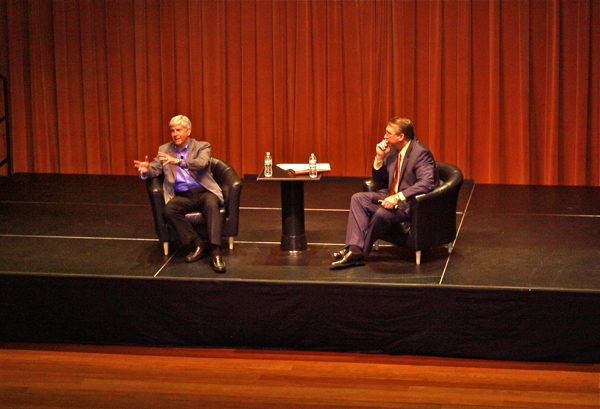Rick Snyder calls for “engaging people on the ground” at speaker series event
Candidate for MIchigan governor Rick Snyder and journalist Roger Martin
sat down for a talk about the state’s — and Detroit’s — future last
Thursday at the Max M. Fisher Music Center. We were there and bring you
highlights from the speaker series event.

Last week, Model D and Declare Detroit joined forces to host a
conversation with gubernatorial candidate Rick Snyder at the Max M.
Fisher Center. The talk was facilitated by Roger Martin, an
award-winning journalist and public relations executive.
The
appearance was part of Model D’s ongoing speaker series. Gubernatorial
candidate Virg Bernero has also been invited by Model D and Declare Detroit, though he has yet to confirm.
We
turned on our digital recorder and came back with some quotable
highlights from the talk. Here are Snyder’s responses to questions from
Martin:
On Detroit: When you drive around the city of
Detroit, it’s a tragedy to see how it is today. But I also see
opportunity. The situation in Detroit, and some of our other cities, in
other part of our state, we never should have had happen to begin with.
And it’s because we didn’t pay enough attention to our government. We
didn’t get involved. We didn’t do a lot of things we should have done a
long time ago. And it’s time to take action.
On establishing a mass transit system:
How many regional chamber conferences have people gone to and heard
about the need for regional transportation systems? It’s like Groundhog
Day. I really prefer public-private partnership models. That’s the best
way to do things where you engage people on the ground, and all sectors
come together to bring results. In that case, you have the private
sector hopefully providing capital, wanting to manage something. And the
role of government is to get out if the way, figure out how we do
permitting, all the regulatory stuff in an efficient fashion. Right now,
in this city, or in many cities in our state, it’s too difficult.
On restoring funding to the state university system:
It’s a world-class system, and it’s being threatened. In one way, we
need to invest more in our colleges and universities. But I’ll also tell
you, we need to ask our colleges and universities to (provide) more
value for the money right now, in terms of how they operate. They need
to be much more efficient in how they operate.
On inventive ways to help balance the budget:
Take Medicaid. We don’t do things right. Because right now the primary
relief valve for Medicaid patients is to go to the emergency room. And
that’s highly expensive. So my view is we should actually be looking at
increasing reimbursement for primary care physicians or health care
professionals. Let’s get them out in the field, let’s get federally
qualified health care centers, they’re an option, and get an environment
where we’re putting more dollars on the front end. If you treat strep
throat on the front lines, it’s $50 or $60 dollars. If they go to the
ER, it’s $500 dollars. So here’s a case of actually helping people,
better, at a lower cost.
More thoughts on health care:
One of the dumbest things we did a few years ago was we cut out our
front-line mental health services. It was a short-term attitude. If we
had had better front-line mental health services, you can help people
that then can hold a job, they can be a taxpayer, they can be a
contributing member of the community. By not helping them, you drop them
one one of two paths. You drop them on the path to the acute health
care system with multiple ER visits, potentially homelessness coming out
of it. The more likely path is you drop them in the Department of
Corrections path, where essentially, because of cutting out alternative
programs, we end up throwing them in prisons and making them good
criminals. It makes no sense.
On working with state legislators:
“I don’t care about credit. I’m not doing this job for my resume. I’m
not seeking any other office. And what I want to have happen, is any
legislator who is part of the solution, regardless of their party —
again, no labels — I want them to claim success. Finally. Because they
haven’t had anything to go back to their districts and say they did. I
want them to go back and make them look really good. Because the more
heroes I can create, the more we got done.
Ashley Woods is Model D Buzz editor.
Photos of Rick Snyder and Roger Martin by Walter Wasacz




